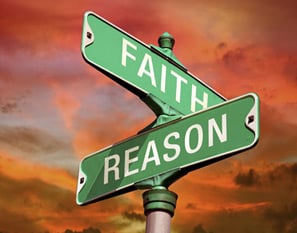Remember you can vote once per day for the About.com Atheism Awards. I’m one of five nominees for Best Atheist Blog. More details here.
Today’s problematic definition of ‘faith’ comes from Loftus, himself, as he expands his description of faith as “an irrational leap over the probabilities.” While emailing a Christian friend, he offered the following definition:
In my opinion faith is what fills in the gaps of the probabilities. If, say there is a 70 % probability something is the case then to conclude more than that 70% probability is faith, and I reject faith based reasoning like that. To reject that kind of faith is to live and operate based on the probabilities. If there is a 70 % chance of something then that’s all I can conclude and that’s all I can use to base my decisions on. And so I could never give my whole life over to a 70% probability. I could only give 70% of my life over to a 70% probability. This is Lessing’s ditch when applied to the past, as you know. Kierkegaard responded by acknowledging Lessing’s point and therefore decided faith must go beyond what the evidence calls for. And that’s what I must reject.
Loftus’s Christian interlocutor replied that he thought the phrase “faith is what fills in the gaps of the probabilities” was spot-on and a great way to encapsulate Hebrews 11:1. I can’t speak to the exegesis, but I sure as heck have an issue with this treatment of probability.
Loftus is essentially saying that, when we aren’t certain, we have to hedge our bets, but that can be the wrong way to reason. Let me give an example. I tell you that I have a weighted coin — it is 60% likely to come down heads and 40% likely to come down tails. Plenty of people, given this data, will conclude that they should call out ‘heads!’ 60% of the time and ‘tails!’ 40% of the time. They’ll lose out to the people who call ‘heads!’ every single time you play with enough iterations.

If you’re doing a math test, you’re going to mark down a lot of probabilities that aren’t zero or one, but, when you’re taking action, you pick the best option you know of and commit to it. It doesn’t matter that you think there’s a only a 70% chance that you’re right, instead of a 99%. If you think it’s the best choice, you’re only self-sabotaging by hedging.
What that 70% means is that you need less new evidence to change your mind about this action than you would if you were truly 99% confident. But, absent that new evidence, there’s no reason you shouldn’t stay the course. Instead of half-heartedly committing to the choice you’ve made, you should just stay vigilant that you don’t discount new evidence in either direction, because you’ve started thinking of your current confidence level as an important part of your identity, one that it would hurt you to lose.
I’ve been framing this in terms of choosing actions, but it goes for beliefs also. The main difference here is that there’s less obviously a moment of ‘choosing.’ When your estimate hits some critical level, you believe. You can’t change your belief by an act of will, or a “jump over the probabilities.” You can only change what you profess to believe, so that you don’t feel like you’re betraying the side. But check out the link in the previous sentence to see how different belief looks from belief-in-belief.
*I’d like to preempt one objection I think may come up in the comments. People are going to ask some variant on the Abraham question: “What if I’m very confident that the right thing to do is the wrong thing?” I think you’re describing your reasoning incorrectly. The choice that’s before you isn’t sundered from all the other data/priors you have; a good Bayesian is factoring them in. Those qualms (or, more precisely, the evidence that causes your qualms to trigger) count as evidence against the choice that scares you.












